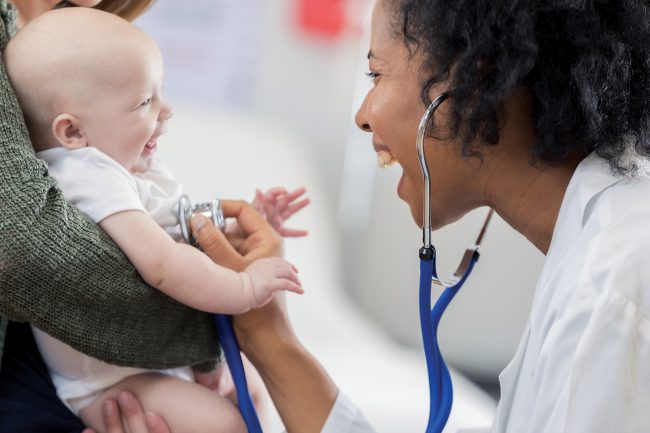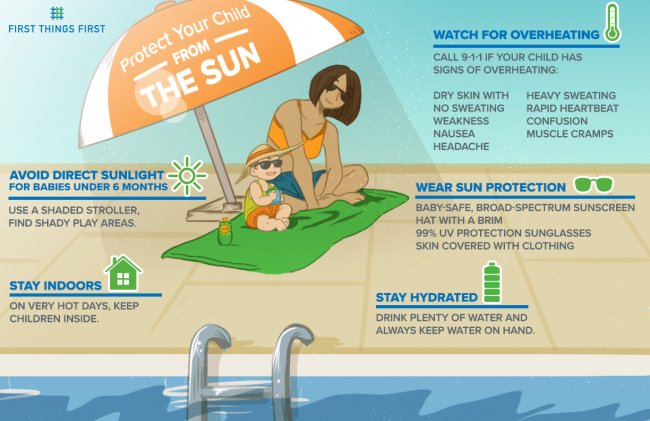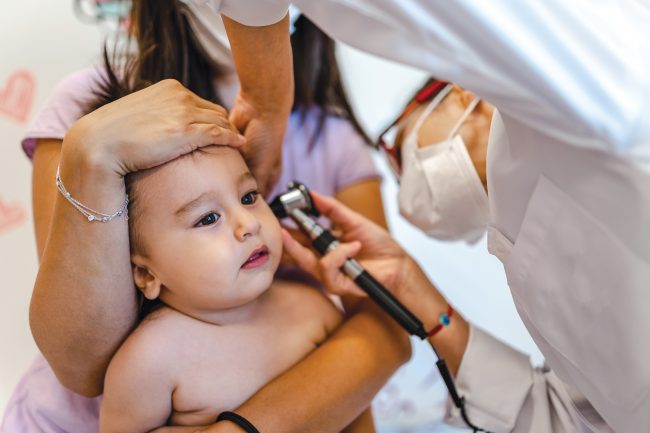There is a lot you can do from day to day to keep your baby healthy. All babies get sick once in a while, and usually it’s not serious. Tips on this page can help you decide when you should call your baby’s doctor. Your baby’s doctor can also give you advice and reassurance.

Health Signs to Watch ForKnowing When Your Baby is SickYou know what your baby is usually like. Changes in how your baby looks or acts can be a sign that they are sick. Changes like these can be a reason to call their doctor:
Always call the doctor or clinic if you are worried, or if your baby does not get better in 24 hours. Here are some times that you should call the doctor:
If these things happen, call 9-1-1:
|
Healthy Hearing and Vision
Parents are often the first to notice a problem with a baby’s hearing or vision. These problems affect your baby’s ability to learn, so it’s important to have them checked out. Babies usually get hearing and vision screenings at certain well-baby visits, but you can ask for a screening any time. Many health insurance plans cover vision and hearing care. This includes Medicaid and KidsCare.
Help with Hearing Issues
- Follow up if issues were found in your baby’s newborn hearing test.
- Your baby might need a hearing screening if they don’t react to loud sounds.
- Your baby might need a hearing screening if they don’t respond when you say their name, after about 6 months old.
Help with Vision Issues
- Your baby might need vision screening if their eyes turn in or out after 4 months, or if their eyes don’t follow objects together.
- Regular vision screenings by your baby’s health care provider can find eye problems that don’t have any symptoms.
- Children can also get an exam from an eye doctor to check for any vision problems.
If you need help getting an eye exam or glasses, contact InfantSEE, Sight for Students, or Arizona Lions Vision and Hearing.
Learn more about vision health at Eyes on Learning.

Staying Safe in the Sun
Babies’ small bodies can overheat very quickly, and their skin is prone to sunburn. When you are out getting fresh air together, use sun protection.
- Keep babies under 6 months out of direct sunlight. Use a sunshade on your stroller and when sitting outside.
- Cover most of your baby’s skin with lightweight, light-colored clothing. Shade their face with a hat that has a brim.
- Put sunscreen on your baby’s exposed skin, but avoid their eyes. Choose a sunscreen made for babies. These use minerals like zinc oxide for protection.
- When the weather is very hot, stay inside with your baby.
- Keep your baby cool in their stroller or car seat. Don’t use a blanket as a sun shade because it can trap heat.
- If your baby is bundled up, watch for signs that they are getting too warm. These include skin that feels sweaty or looks flushed.
- With car seats and strollers, watch out for plastic and metal parts that have gotten hot in the sun.
- Call 9-1-1 if your baby shows signs of overheating, including weakness, nausea or vomiting, dizziness or fainting, heavy sweating, a high temperature or fast breathing and heartbeat.
Giving Your Baby Healthy Air to Breathe
Babies’ small, growing lungs can be hurt by even small amounts of harmful chemicals in the air. Even some substances that adults don’t mind breathing in can hurt babies’ health. To give them clean air:
- Keep all kinds of smoke out of your home. This includes candles, fireplaces and things that you smoke.
- Keep your baby indoors and close your windows if dust is blowing around outside or the air is smoky.
- Know what the air quality is in your area. Go to Airnow.gov to check on the air quality.
- Set up a clean-air space in your home to use when air quality is bad outside.
- Open windows and doors when the air is clear and the weather is good.
- Try to avoid scented cleaning and beauty products, which can contain irritating chemicals.
- Clean your home often, to remove substances that can irritate the lungs. Check out these tips on cleaning without irritating lungs.

About Ear Infections
Ear infections are common in babies and toddlers. Your baby may have a fever, be fussy or cry more than usual or pull on their ear when they have an ear infection. If your baby seems to have an ear infection, call their doctor.
More Ways to Find Help
Environmental Protection Agency — Tips on protecting children’s health.
The First Things First Parent Kit was developed in partnership with Health Research for Action/UC Berkeley. © 2023 The Regents of the University of California. Additional video, graphic and other content © 2023 First Things First. All rights reserved.

